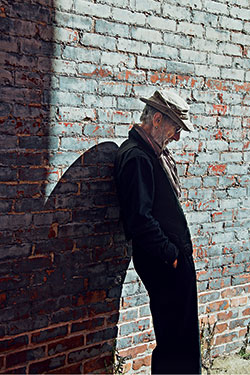
Four decades ago, in 1971, Frank Serpico—bohemian cop, Brooklynite, whistle-blower—was shot in the face during a drug bust and left for dead by his fellow officers. That same year, he went before the Knapp Commission, a five-man panel convened by Mayor John Lindsay to investigate systemic corruption in the NYPD, and provided information on his fellow officers. Sidney Lumet made a movie about him, casting Al Pacino in the titular role. According to the American Film Institute, Serpico is No. 40 on the list of the 100 most beloved film heroes of all time, one notch below Lassie and one above Arthur Chipping, of Goodbye, Mr. Chips. (Atticus Finch is No. 1.)
These days, Serpico lives in quiet isolation in the town of Stuyvesant on the Hudson River, in a cabin he helped build. He owns an old laptop, but the cabin has no wireless connection, so once or twice a week, he drives his Toyota to nearby Hudson to drink espresso, talk with friends, and check his e-mail at the public library.
Even in Hudson, a city populated by a mix of flamboyant artists and aging hippies, Serpico, who at 77 is still sharp-witted and debonair, cuts a striking figure, and everywhere he goes, cries of “Paco! Paco!” follow. On a recent afternoon, he strode down the main drag of Hudson, clad in a black vest and an array of silver jewelry, including a bracelet and necklace (it doubles as a looking glass) and hoop earrings. On his head he wore a straw boater that he had purchased from an Amish man upstate.
“You think Amish are so pure, but they’re just like us,” he explained as he passed the cluttered window of an antiques shop. “The joke this Amish guy told me! It’s about the bishop who caught the avian flu. Ready? He got it from the cardinal.” Meeting Serpico can be a wonderfully disorienting experience. So perfectly did Pacino capture Serpico’s Brooklyn bonhomie—the off-kilter smile, the sharp laugh, the lengthy but genial soliloquies on the crooked paths of cosmic justice—that you can close your eyes while the real Serpico is talking and expect to find Pacino when you open them again.
Serpico debuted in 1973, but the real Serpico wasn’t around to bask in the success: He’d fled to Europe. When he returned to the States in the early eighties, he no longer wanted anything to do with New York City. He avoided the spotlight for the next three decades, until two months ago, when he received a subpoena asking him to turn over documents related to the case of Adrian Schoolcraft, an NYPD cop who claims he was forcibly committed to a mental hospital by his colleagues after collecting evidence of widespread corruption. Schoolcraft is suing the NYPD for $50 million for unfair retaliation. The court case is ongoing.
Serpico admits he counseled Schoolcraft extensively, and he believes the younger whistle-blower’s lawsuit is “legit.” But as for any correspondence, he said, “I don’t remember if I have any, and I’m not going to go busting my chops looking for ’em.”
The Schoolcraft case has dredged up the animosity of some cops, who, 30 years later, still feel betrayed by Serpico. A friend recently turned him on to a web forum popular with police, where he found comments calling him, in decidedly cruder terms, an Italian snitch. Does it still sting?
“All you can do is laugh,” he said.
Near the corner of Warren and South 5th, Serpico ducked into one of his favorite restaurants, Earth Foods. “Paco!” The restaurant owner said from the kitchen. “You want a burrito, right?”
On his way to his usual table, he was stopped by an older woman with thin blonde hair and watery blue eyes named Patricia Naggiar; a few years ago, she and Serpico acted together in a play called Outward Bound. They both played dead people.
“Do you have a name for your article yet?” she asked a visiting reporter. “How about ‘The Aging Casanova’? Every time I see him, he’s surrounded by young women.”
“I’m trying to help them!” said Serpico, who currently has a younger girlfriend.
“Some help,” Pat said.
The former cop took a seat outside, where he could people-watch. Between bites of burrito, he detailed the happily sedentary life he now lives: the lectures at local universities; the slow work on his memoirs; his appearances on public-radio programs, where he’ll recite his own poems aloud. He still follows the news—the Occupy movement “electrified and then disappointed” him; stop-and-frisk was an “abomination”—but not as much as he used to. And his health is good, even if he is mostly deaf in one ear and afflicted with a perpetually runny nose, thanks to the lead fragments buried somewhere in his nasal canal.
After he had cleaned his plate, he gave his regards to the chef—“Il cibo era delizioso!”—and headed to his car. While he walked, he discussed his legacy. “I think I’d like to be remembered first as a human being, but one that took that responsibility seriously,” he said. “Because I really believe we’re all put here to make the world a better place. You can write that down.”
Have good intel? Send tips to intel@nymag.com.